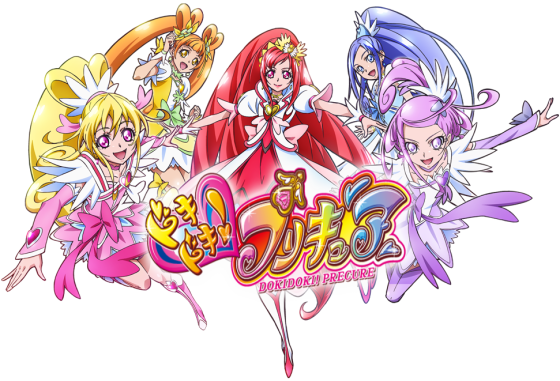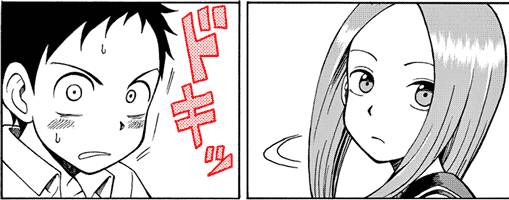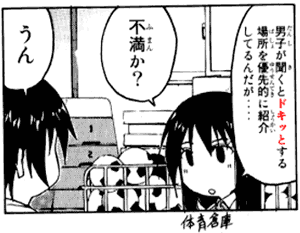Often, however, it implies romance, like in Doki Doki Literature Club or in PreCure.
Source: Doki Doki! PreCure website
Definition
You can imagine doki-doki means *thump-thump* if you want, so one doki = one *thump*.There's a reason the word doki-doki is doki-doki, said twice, and not just one single doki: it's a pattern found in many reduplicative Japanese words. By saying doki twice, it implies it keeps going on, even if unsaid—doki-doki-doki-doki-doki—rather than just a single doki and then it stops.
Also, unless I really suck at biology, (living) hearts are always thumping, they don't just... stop. So you don't write doki-doki just to say "hearts are thumping, yes." Instead, it means those aren't normal beats, but audible beats, because your heart is beating harder, better, faster, stronger.
You may notice that the Japanese onomatopoeia for a sound (doki) is different from the English one for the same sound (thump). This is normal. Lots of languages have different onomatopoeia for the same thing. "Meow," for example, is nyaa にゃー in Japanese and "miau" in Portuguese.
Lastly, doki-doki is really an onomatopoeia and though it's used in a lot of ways (see Grammar below) it's not really the word for "palpitation," that would be kodou 鼓動 instead.
Kanji
Regarding the kanji of doki-doki... well, there isn't one.Most onomatopoeia don't have kanji. They spell the literal sound of things, so they're written with katakana, instead. Though they may also be written with hiragana for aesthetic reasons, like to look more cute-ish in a manga for "young girls," shoujo 少女, for example.
Grammar
In Japanese, mimetic words such as onomatopoeia such as doki-doki can have a number of functions you wouldn't see in English. In particular, a lot of them can be used as verbs and adverbs. Below I'll show some grammar examples with the word doki-doki.First, as a noun:
- doki-doki ga tomaranai ドキドキが止まらない
The *thump-thump* won't stop.
The [thumping] won't stop.
The [thumping of my heart] won't stop.
Second, as a verb, with the help of the auxiliary verb suru する, "to do." In this case it implies something is making the doki-doki sound.
- doki-doki suru ドキドキする
It does *thump-thump*.
It *thump-thumps*.
[My heart is thumping]. (completely non-literal.) - doki-doki saseru ドキドキさせる
To make *thump-thump*.
To make [your heart beat faster.] - doki-doki saserareru ドキドキさせられる
- To be made *thump-thump.* (passive causative.)
[Your heart beat faster] because of [something.]
You got *thump-thump'd* by something. - To be able to make *thump-thump.* (causative potential.)
- To be made *thump-thump.* (passive causative.)
- shirazu-ni doki-doki shite-shimau 知らずにドキドキしてしまう
Without knowing ends up doing *thump-thump*. (don't be literal, folks.)
[Before I know it, my heart] ends up [beating faster.]
Third, as an adverb, with the help of the to と particle. This creates an adverbial onomatopoeia, which means that a sound is emitted as one thing is done. In this case, the thumping sound.
- dokidoki to mune ga taka-natta ドキドキと胸が高鳴った
Chest throbbed with a *thump-thump.*
With a *thump-thump* chest throbbed.
[Making a thumbing sound, my] chest throbbed.
You Make my Kokoro go Doki Doki
For reference, how you write "you make my kokoro go doki doki" in Japanese, a.k.a "you make my heart thump," and other meme phrases you're more likely to see used by some weeaboo than in actual Japanese.As always, watashi, ore, boku all mean "I/my/me" and are grammatically interchangeable. Likewise, kimi, anata, omae, kisama all mean "you." In both cases there's a pretty big different in nuance.
The word kokoro 心 means "heart" mostly figuratively. The word for the physical heart,the body part, would be shinzou 心臓.
- kokoro ga dokidoki suru 心がドキドキする
Kokoro goes doki doki.
[My] kokoro goes doki doki. ("my" is implied.) - watashi no kokoro ga dokidoki suru 私の心がドキドキする
ore no kokoro ga dokidoki suru 俺の心がドキドキする
boku no kokoro ga dokidoki suru 僕の心がドキドキする
My kokoro goes doki doki.
(explicit "my.")
- kimi ga ore no kokoro wo dokidoki saseru 君が俺の心をドキドキさせる
You make my kokoro go doki doki. - senpai ga watashi no kokoro wo dokidoki saseru 先輩が私の心をドキドキさせる
Senpai makes my kokoro go doki doki.
Now, in case you haven't noticed it, the reason why you're unlikely to see these phrases in Japanese is because you don't really need the kokoro in them. Remember: doki-doki is the onomatopoeia for the thumping of the heart, the heart is already implied, there's no need to add it to the sentence.
- kimi ga boku no kokoro wo doki doki saseru 君が僕の心をドキドキさせる
You make my "heart" go thump-thump. - kimi ga boku wo doki doki saseru 君が僕をドキドキさせる
You make me go thump-thump.
Likewise, in the passive voice:
- boku no kokoro ga kimi ni dokidoki saserareru 僕の心が君にドキドキさせられる
My "heart" is made go thump-thump by you. - boku ga kimi ni dokidoki saserareru 僕が君にドキドキさせられる
I'm made go thump-thump by you.
Finally, a totally not romantic way of saying this heart stuff would be:
- shinzou no kodou ga hayaku naru 心臓の鼓動が早くなる
The palpitation of the heart becomes faster.
Single Doki どき
As a word, dokidoki is normally said dokidoki, as two doki, not one, since it implies continuous heart-thumping. In some cases, however, you may find a single doki alone instead of dokidoki. This means you have only one stronger heart-beat there, not multiple.
Manga: Karakai Jouzu no Takagi-san からかい上手の高木さん (Chapter 1, 消しゴム)
- doki'
ドキッ
*thump*
This lone doki ドキ can get the to と particle too, turning it into dokitto ドキッと, literally "with a single-thump." It translates to English, ironically, as "to have your heart skip a beat."
Manga: Seitokai Yakuindomo 生徒会役員共 (Volume 1, Page 18, ご案内)
- Context: Amakusa Shino 天草シノ guides the new student Tsuda Takatoshi 津田タカトシ around the school, showing him places like school infirmary, the girls' toilet, a classroom that's usually not used by anyone, and the finally the "physical education storeroom," taiiku souko 体育倉庫.
- {{danshi ga kiku} to dokitto suru}
basho wo {yuusen-teki ni} shoukai
shiteru-n-da ga...
男子が聞くとドキッとする場所を優先的に紹介してるんだが・・・
[I] am {prioritizing} introducing [you] to places [that] {{when boys hear about} [their] hearts skip a beat}, but... - fuman ka?
不満か?
Are [you] unsatisfied? - un
うん
Yes.
Both languages are referring to the same thing, but English is focusing on the fact a single stronger heart-beat messes your heart's rhythm so you end up "skipping" a beat.



No comments: